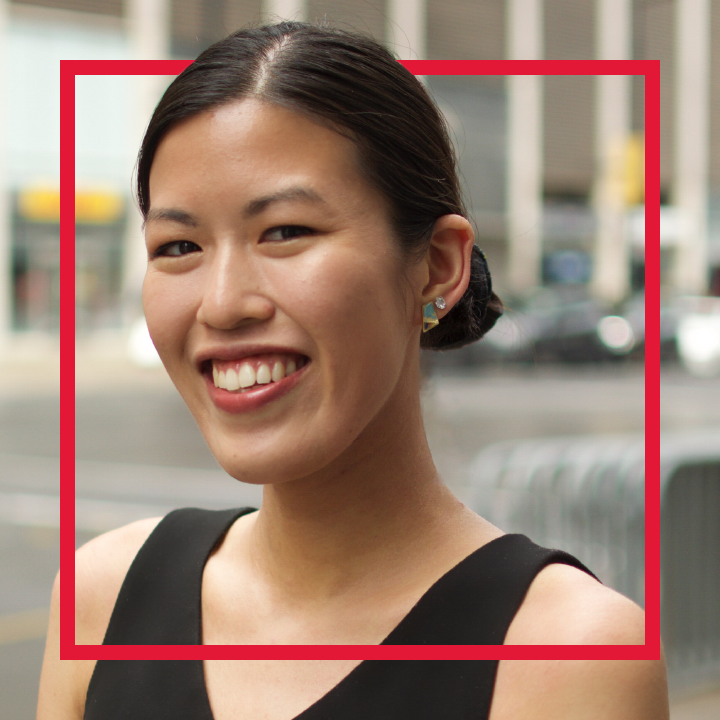Rowena Tam (BA '17) is a settler, artist, researcher, and creative arts therapist currently living and working in Tiohtià:ke/Mooniyaang/Montreal, on unceded Kanien'kehá:ka territory. In 2021, she was named as one of York’s Top 30 Changemakers Under 30. We spoke with Rowena to learn more about her career and her experience living in Montreal.

Tell us about your career as a creative arts therapist.
In my first year of theatre studies at York, I knew I wasn’t going to pursue a career in theatre production or performance. I was more curious about the emotional rigor and psychosocial effect that performance could have on our mental state. As a theatre artist, I was unsure how to hold space for others. This is why I chose to pursue a minor in psychology at York. Creative arts therapies have several different modalities including art, music, drama, dance/movement and play therapy. I streamed into drama therapy with my theatre background.
We use our bodies to understand the trauma and memories that exist within us and we work on it using interventions such as imagination, roleplay, puppetry and movement. Getting in touch with our bodies has become a more prevalent way to tackle psychosomatized issues and problems. What I love most about the creative arts therapies is knowing that we offer alternative routes into exploring what our memories have stored and how we can react and respond to them.
Drama therapy, and in particular, the NADTA’s Cultural Humility, Equity and Diversity Committee is modelling a lot of important anti-oppression and anti-racist work. I was part of the Drama Therapists Against White Supremacy campaign that was launched in 2018. I think we’re only realizing now that this subject of power, privilege and oppression is so obviously entrenched in our work and everything we do. Although I’m facilitating therapeutic services, I question how effective these services are if the foundation itself can be a suppression of decolonized knowledge.
You also work with Indigenous communities in Montreal. Can you share more about that?
I work for the Montreal Indigenous Community NETWORK which partners with external allied organizations who are committed to improving the quality of life for First Nations, Inuit and Métis community members in the Greater Montreal area.
I began as a community researcher, and have since transitioned to a wellness coordinator, supporting the needs and wellbeing of our Indigenous colleagues and community members. I’m also currently reexamining the policies we have in place and looking at how we can adapt these and bring in political advocacy, cultural healing and safety.
I felt compelled to work here. When I worked in a prison, I learned that Indigenous women represent five per cent of the Canadian population yet make up 60 per cent of the federal prison population. I realized that as a person of colour who has their own struggles, it’s really important for minoritized communities to build solidarity with Black and Indigenous communities in order to tackle white supremacy.
What was your experience like moving from Toronto to Montreal?
It was a culture shock. I found fewer people that looked like me, which meant there was a feeling of less safety along with many more racist and discriminatory encounters experienced. One of the many perks that I’ve experienced include access to green spaces. Montreal is very walkable and biking is very common – I am a part of the herd of cyclists.
The culture itself is very different. Toronto has a narrative of you either sink or swim. Montreal asks, what if you want to float? Aside from some of the drawbacks, mentally and emotionally it feels healthier to be here.
Congratulations on being selected as one of York’s Top 30 Changemakers Under 30. What does this recognition mean to you?
I think we put so much pressure onto people to have their life figured out and achieve things by the time they are 30. My initial thought was oh man, I don’t want people to feel like if they’re starting something at 40, that they can’t be recognized for their accomplishments. I want to pave the way for those who might not make it onto lists such as these and think about how we can offer them recognition. I’m humbled, but I want to see more happen!
What’s next for you personally or professionally, Rowena?
I intend to continue to prioritize my mental wellness, create art and soak in the beautiful Montreal surroundings whilst also dreaming of justice. In my professional life, I hope to incorporate those practices whilst doing the work to deconstruct and dismantle many of the systems and structures that continue to harm and silence minoritized communities.
I will be returning to Concordia University to pursue a PhD in the individualized program in social sciences, and I hope to continue working at the Montreal Community Indigenous NETWORK part-time. I find that many academics don’t really understand the communities they work with. Being part of the community in my personal, professional as well as academic worlds I think will help to transform my next couple of years. It’s also my way of giving back and grounding myself in community work.
